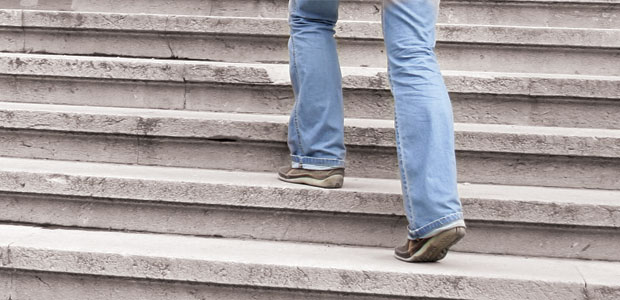Advertisement
Small Steps Toward Health
90 seconds at a time

Take it one step at a time. That’s the advice we hear when we’re overwhelmed and don’t know where to start. The thought of beginning a healthier lifestyle can be daunting, but it really is just a matter of making little changes to your daily routine.
What follows is a collection of small steps that can make a big difference in your health–and they all take less than a minute and a half.
Dance Like Nobody’s Watching
Mark Twain gave that advice, and it can produce some healthy results. Whether it’s to ABBA or AC/DC, 90 seconds of dancing to your favourite tune can deliver a physical and mental pick-me-up. It can also help distract you from food cravings if you’re on a diet. While you’re counting calories, you’ll be happy to know that 90 seconds of energetic dancing burns about 20 calories–roughly the same number of calories in a teaspoon of sugar.
Dab on Some Olive Oil
According to beauty expert Paula Begoun, extra-virgin olive oil is more than just a healthy cooking ingredient; it’s also an excellent emollient. She suggests applying a drop or two onto extra-dry areas after your regular moisturizing routine. Dry skin will not only benefit from the moisturizing boost, but it will also absorb healthy antioxidants. For more about beauty facts and fiction, go to cosmeticscop.com.
Let Your Fingers Do the Talking
A decade-long study of Australians aged 70 and older found those with a strong social network lived longer than their reclusive counterparts. It takes only seconds to open an email, type a short message, and hit the send key. Sending a friend a short e-postcard will help you stay in touch until you can spend time together.
Book ’em Dano
Make a quick phone call to book a screening test such as a Pap test, mammogram, or colon exam. While cancer rates continue to rise, survival rates are also rising. These positive outcomes are being attributed to screening programs which can find cancer in its early stages, so it can be treated more effectively.
Open Wide
The Canadian Dental Association recommends giving your mouth a regular visual check. Oral cancer most often appears on the sides and bottom of the tongue as well as on the floor of the mouth. Look for patches of red or white, and keep an eye on sores that aren’t healing. Check all surfaces for lumps or thickenings. If you find problems, see your health care practitioner immediately.
Avert Your Eyes
If you are spending long stretches of time at your computer, remember to look away from the screen every half hour. Focus on a point in the distance for 15 seconds. The short break can help prevent eye strain and tension headaches.
Chew a Chunk of Chocolate
In recent years chocoholics have been thrilled to learn that chocolate can be a healthy treat–in moderation. Its antioxidant properties have been linked to cardiovascular benefits such as lower blood pressure and a reduced risk of blood clotting. This year scientists found that dieters who ate a big breakfast followed by an ounce of chocolate lost more weight over the long term than dieters who followed a low-carbohydrate diet.
Turn Bath Time into a Scent-sation
According to The Aromatherapy Bible by Gill Farrer-Halls (Sterling, 2005), adding a few drops of essential oil to your bath can alleviate stress and leave you feeling relaxed. Farrer-Halls suggests making your own elixir of calmness by combining 2 drops each of lavender, camomile, and geranium essential oils with 1 tsp (5 mL) almond oil. For extra serenity, hang a do-not-disturb sign on the bathroom door.
Take Flight
Climbing a flight of stairs instead of taking the elevator will not only save you time, but will also strengthen your heart, tone your leg muscles, and burn extra calories. Health Canada recommends a minimum of 30 to 60 minutes of exercise daily, but it can be accumulated over the course of a day.
To study the benefits of short spurts of physical activity, a group of UK scientists conducted a six-week study of inactive young women. The group who progressed from climbing one flight of stairs to six flights of stairs a day showed an improvement in heart rate, oxygen consumption, and blood cholesterol level.
Stretch a Little
Stretching stiff muscles promotes flexibility, prevents injury, and helps dispel tension. Nikos Apostolopoulos, a Vancouver-based sports medicine specialist recommends gentle stretching for short periods of time–30 to 60 seconds per stretch. He says going for the burn is actually harmful; instead, he advises stretching until you get a lukewarm feeling in your muscles. Consult a personal trainer or yoga instructor for specific stretches and to make sure you’re performing them correctly.
Remember Vitamin D
Vitamin D is an important nutrient because of its role in maintaining healthy bones, and it is also thought to play a role in cancer prevention, specifically colorectal cancer. According to the Dieticians of Canada, adults over 50 are particularly at risk for vitamin D deficiency.
In theory we should be able to derive enough vitamin D from our diet and from adequate exposure to UVB light, but those of us who live in northern climates fall short, especially in winter. Include a vitamin D supplement in your daily routine.
Give a Little Bit
Take a minute to write a cheque to your favourite charity or buy a small gift for a friend. Small actions such as these can make you happier and healthier. A recent study published in the journal Science, reported that people who spent money on others reported greater feelings of happiness than their counterparts who spent money on themselves.
Happiness researchers report that the glow from those positive feelings actually pays off in a healthy immune system and a lower heart rate.




